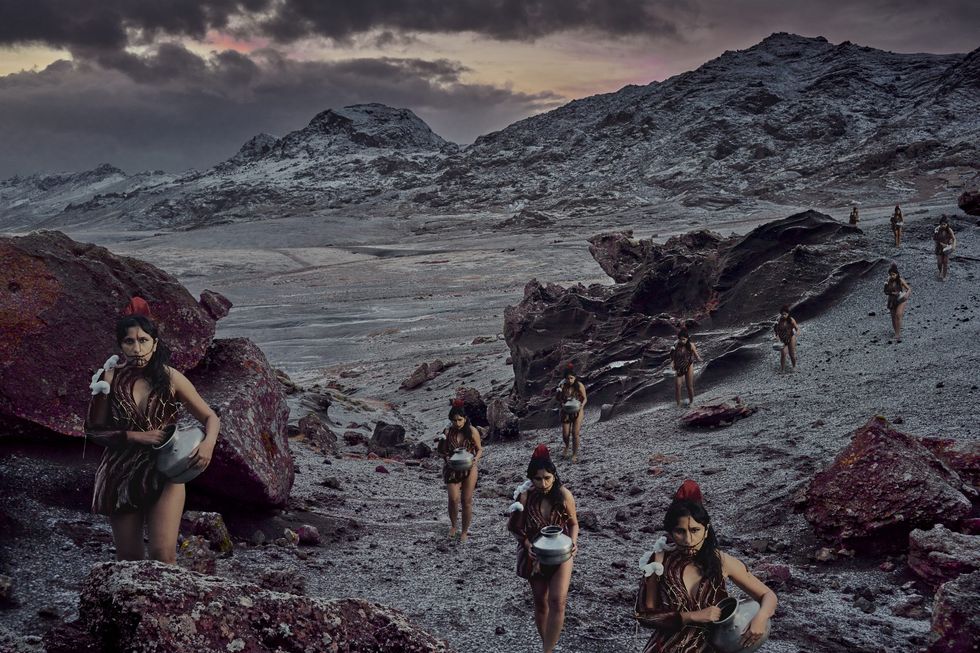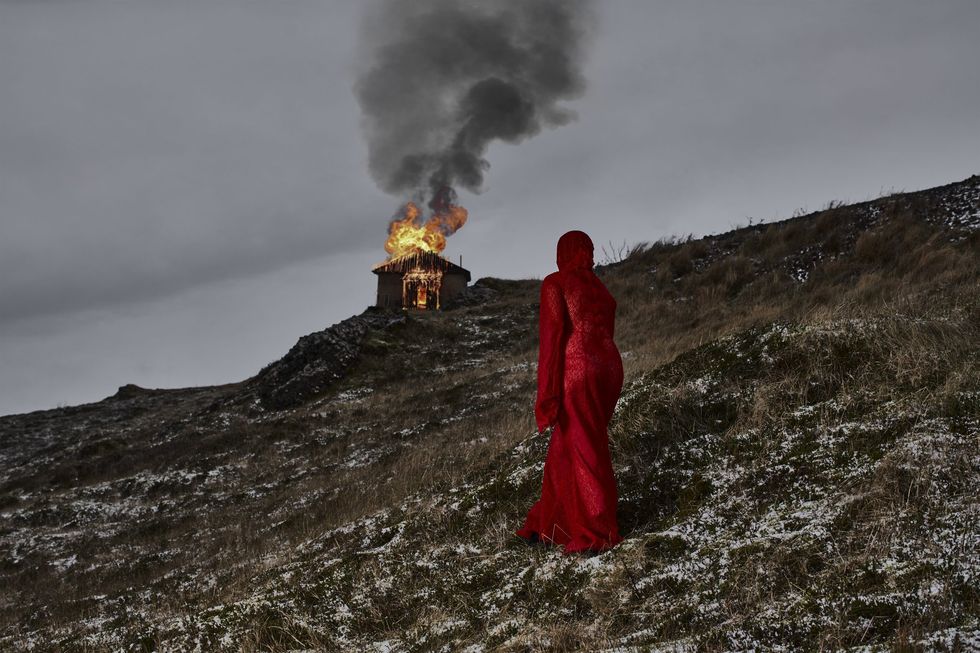AN ARTIST and activist has highlighted how the lack of clean water and toilets limits the potential of women of colour for WaterAid.
Poulomi Basu’s photo series, Sisters of the Moon, depicts the impact of sanitation on women and girls across south Asia.
She has created a fictional, “dystopian world” in Iceland, by placing herself in the photographs to show the struggles of women and girls from across the global south and highlight the politics of race, representation and environment justice.
Among the 14 images are one of a bed submerged in water, inspired by women Basu met in Bangladesh who are living on the frontline of climate change and whose homes were lost and many flooded as a result of rising sea levels.
Basu told Eastern Eye: “Sisters of the Moon is an explosive theme on women and girls all over the world, largely girls from south Asia and mostly women of colour, who pay a bigger price for water crisis and climate change, but it does affect every other woman.
“We wanted a setting that was not purposely located in south Asia, such as India or Bangladesh, because then it becomes about that place.
“We wanted to show the frontline of climate change in a way that points towards ice and snow, not just water. The idea was to create a fictional, sort of dystopian world, and the beautiful barren landscape of Iceland was selected as the backdrop to portray events, as both uphold the myths and mythologies that rule women, our lives, but also show the frontline of climate change.”

Basu was shortlisted for the Deutsche Börse Prize in 2021 and has won awards for her photobook, Centralia.
Sisters of the Moon is being released to support WaterAid’s efforts to bring clean water, decent toilets and good hygiene to millions of homes and schools worldwide. The UK government will match public donations up to £2 million that are made until February 15.
Basu said, “With access to clean water and decent toilets, girls can stay in school, women have the time to earn a living, take charge of their livelihoods and the whole communities can be healthier.”
In India, woman's access to clean water is determined by her caste, Basu said. “In some ways, a woman's status is connected to birth as well as caste and it is a big issue in India; that kind of determines your status in society and your access to water.
“Worldwide, one in 10 people has no access to water close to their home and girls are often responsible for carrying water; that's why girls drop out of school. They make long journeys on difficult terrain and landscapes, putting their safety at risk and leaving little time to go to school and honour living.”
Basu said governments - specially in south Asia – should o make available water close to households, so a girl child doesn't miss out on education.
She added, “Every household should understand that you cannot marry your girls into homes that do not have toilets, at schools you cannot give good education unless there are decent toilets and water supply for women; government needs to understand that.
“Sadly, being born as a female is considered to make one less valuable than being born as a boy.”
One picture features a woman in a red veil walking towards a burning hut, alluding to defiance against the practice of ‘chaupadi’ in parts of Nepal, where women are forced to isolate during their period when they are considered unclean.

Basu told Eastern Eye this was inspired by a true event. “A girl felt too ashamed to leave her chair at school because she was terrified that if she stood up, you know... the shame is so huge, and in most places, regarding blood, it's seen as such a matter of shame that she stopped going to school and dropped out of education because she didn't have access to proper sanitary pads and toilets.
“So that inspired one of the artworks - that menstruation should not hold anyone back because they do not have decent toilets and facilities or proper sanitary pads.
“If you deny women access to water and toilets, you basically take away their power. We need to understand that no matter what background they come from change is possible, and it is possible to get what you want in your life through education because that is your ticket to freedom," Basu said.
In another photo, women are carrying water pots over a snowy, rocky terrain, reflecting the challenging journeys millions of girls make every day to collect water.
It has been two months since Glasgow hosted COP-26, the climate change summit, attended by prime ministers and presidents from all over the world.
Basu claimed patriarchy and misogyny were linked to the water crisis, which in turn, according to her, was related to climate.

"The world needs to understand that water is also connected to issues of patriarchy and misogyny and also to climate. Again, that will directly impact women and women of colour.
"There is a connection between being overwhelmed and not having access to water, and discussions need to be aligned to not just solving water problem, but also solving other problems that come in the way of being a woman, which are patriarchy and misogyny."
WaterAid chief executive Tim Wainwright said, “Poulomi Basu’s thought-provoking photo series captures how fundamental clean water and decent sanitation are in tackling gender inequality and helping people overcome poverty. If these basic human rights are met, girls can stay in school, women have the time to earn a living, and whole communities can be healthier while also building resilience against the effects of climate change.”
*Sisters of the Moon is supporting WaterAid’s Thirst for Knowledge Appeal www.wateraid.org/uk/sistersofthemoon



















 Damian Talbot
Damian Talbot